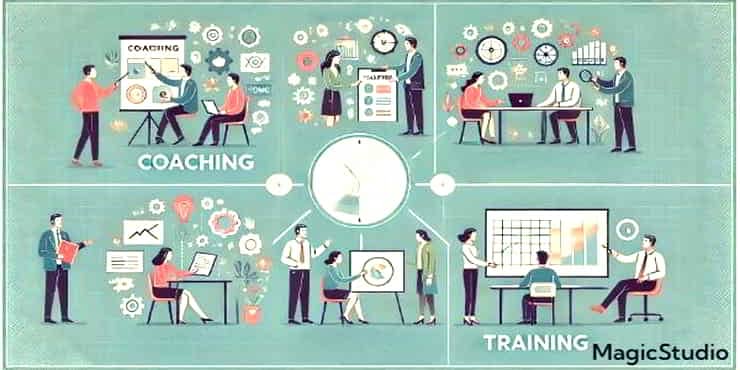Coaching vs Training: 2 Extremes – Key Differences Explained

Estimated reading time: 6 Min
Coaching vs training: 2 ends of a spectrum that includes facilitating, mentoring, and teaching. What are the differences? Discover which role you play, or need.
Let’s rewind to the early 1980s, when I first dipped my toes into the world of coaching.
Back then, it wasn’t as mainstream as it is today.
My formal training was in the late 1980s, and it was fascinating to see how coaching intersected with other roles like teaching and training.
Now, you might be thinking, “What’s the big deal? Aren’t these all just different ways of helping people learn and grow?”
Well, yes and no.
The thing is, that many internet practitioners have jumped onto a commercial bandwagon, promoting themselves as coaches, with the single intention of making money.
Of course, we all need, and have the right to earn a living.
However, in a professional world, coaches need to deliver something of genuine value; many self-proclaimed coaches are simply marketing a perception.
Anyway, moving on, in order to discuss the distinctions, I cover the roles of coaching, facilitating, mentoring, teaching and training.
While there’s certainly some overlap, understanding the nuances between these roles can make a world of difference in how you approach your work and how effective you are.
So, What Are The Differences?
What Is Coaching?
I start here because coaching is my background.
Think of coaching as a partnership. It’s about inspiring individuals or teams to reach their full potential.
A coach helps you clarify your goals, helps you figure out what makes you tick, and then guides you on a journey of self-discovery and development.
It’s less about telling you what to do and more about helping you find your own answers.
I’ve often found myself coaching clients who are technically more expert in their subject area than me.
I might not know the ins and outs of their field, but I can help them develop the personal learning strategies and approach they need to excel.
What Is Facilitating?
Facilitating change workshops was my favourite role!
This is where things get a bit tricky.
Facilitation is similar to coaching in many ways, but the focus is more on guiding teams through specific projects or challenges.
A good facilitator is like a conductor, ensuring everyone is working together harmoniously and making progress towards a shared goal.
In addition to coaching skills, they need strong team management skills, an eye for detail, and the ability to influence group dynamics.
What Is Mentoring?
Now, this is where personal experience comes into play.
A mentor is someone who’s “been there, done that” and is willing to share their wisdom and knowledge to help you overcome specific challenges.
It’s a more informal, relaxed relationship than coaching, often with a touch of teaching thrown in.
Think of it as having a knowledgeable friend in your corner, noticing when you need support, and guiding you through the ups and downs of your journey.
What Is Teaching?
This one’s probably the most familiar.
Teaching is all about communicating ideas and practices in a structured way so that others can become more knowledgeable and develop necessary skills.
It often involves formal education settings, but not always.
These days, with the rise of online learning, many “experts” call themselves a “coach” or “teacher” with little understanding of what those roles are.
There’s a big difference between someone who simply shares information and a true teacher who knows how to break down complex concepts and make them easy to understand.
What Is Training?
This is where the rubber meets the road.
Training takes teaching to the next level by focusing on practical skill development.
A good trainer not only explains the theory but also guides you through hands-on exercises and activities to help you master the skill.
In the world of sports, for example, trainers have to wear many hats: educator, coach, motivator, and physical conditioner.
It’s a demanding role that requires a diverse skill set and the ability to manage multiple aspects of an athlete’s development.
The Blurred Lines and Why It Matters
In my experience, the lines between these roles can get a bit blurry.
I’ve seen people call themselves “coaches” when they’re really doing teaching or training.
And that’s not necessarily a bad thing, as long as everyone is clear on what’s happening.
The key is to understand the unique value that each role brings to the table and to be able to adapt your approach depending on the requirements of a situation.
The Bottom Line
Whether you think of yourself as a coach, facilitator, mentor, teacher, or trainer, your ultimate goal is to help others learn, grow, and achieve their goals.
Each role has its own strengths and areas of focus, but the most effective professionals are those who can seamlessly blend skills from different disciplines to meet the unique needs of their clients or students.
As someone who relates to primarily fulfilling the role of a coach, I like to think my contribution is about helping someone figure out what they want to achieve, how to get there, and to stay motivated on the way.
So, instead of teaching people how to fish in order to be able to feed their family, I like to think I help them become empowered and take personal responsibility for learning whatever they need to achieve whatever they want.
So, next time you see someone with a fancy title, don’t be afraid to ask them what they actually do.
And if you’re the one with the title, take some time to reflect on how you can best serve your clients or students by drawing on the full range of your expertise.
FAQs: Coaching vs Training
What is the main difference between coaching and mentoring?
Coaching focuses on helping individuals achieve their goals through self-directed learning, while mentoring involves sharing personal expertise to guide someone through specific challenges.
Can a coach also be a teacher or a trainer?
Yes, many skills overlap, and professionals often blend these roles depending on the situation.
Why is role definition important in these professions?
Clear role definitions help manage expectations for recipients and ensure effective delivery.
How can one transition from being a coach to a facilitator?
By focusing on team dynamics and project-specific goals rather than individual development.
What skills are crucial for a successful trainer?
A mix of theoretical knowledge, practical skill development, motivational techniques, and the ability to adapt to various learner needs.
Summary
On the scale of coaching vs training there are various distinct roles.
- Coaching, facilitating. mentoring, teaching, and training are distinct roles with unique strengths and areas of focus.
- Understanding the nuances between these roles can help you better tailor your approach to the needs of your clients or students.
- The most effective professionals are those who can adapt and blend skills from different disciplines.
- Don’t be afraid to ask questions and clarify roles to ensure everyone is on the same page.
By embracing the overlap and valuing the distinctions, you create a more meaningful and impactful experience for everyone involved.
What do you think?
😉
Richard






